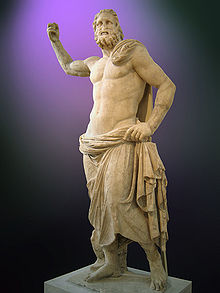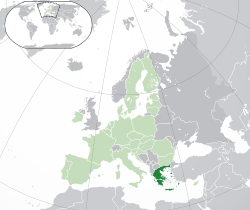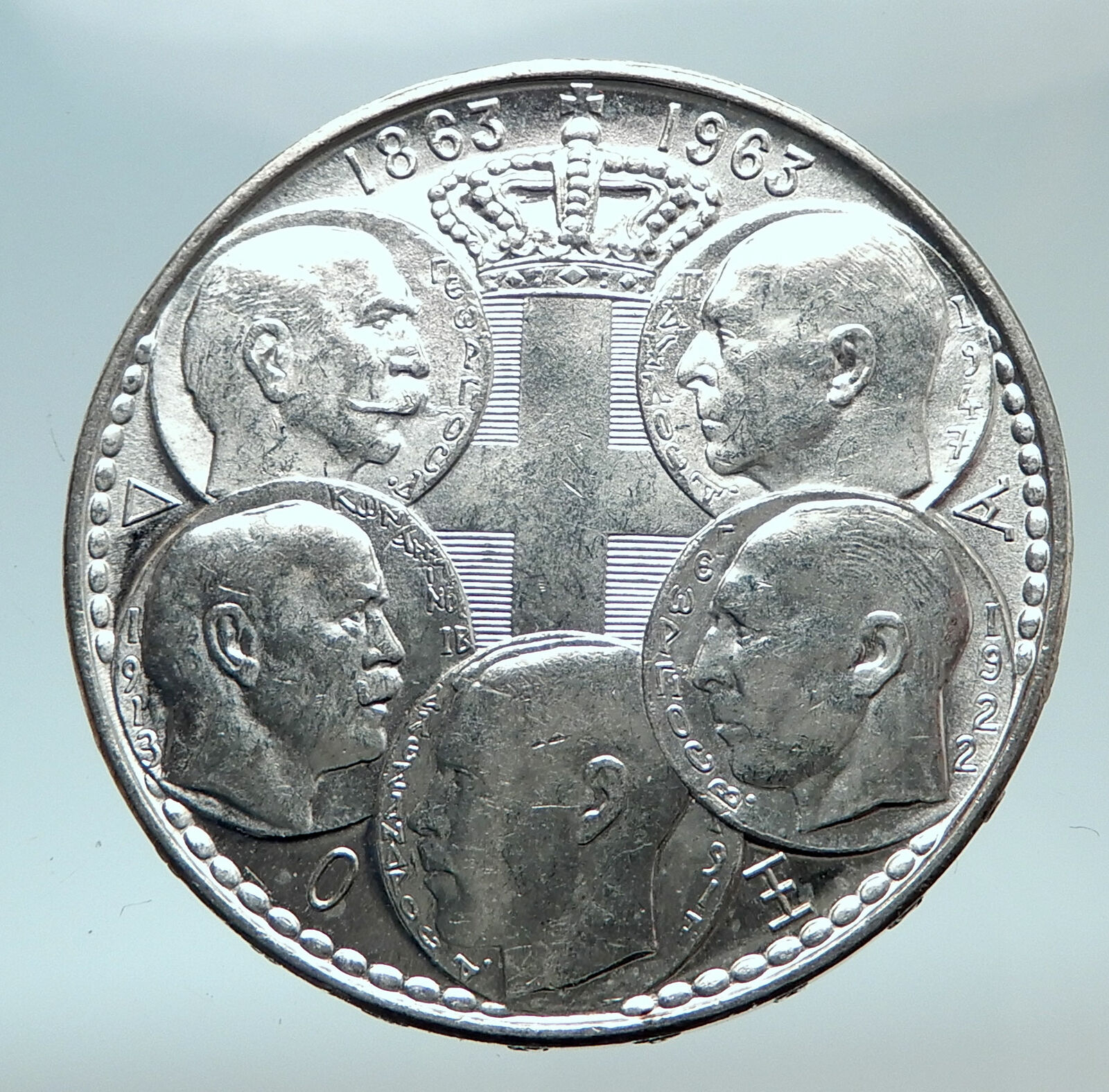|
Greece – Paul I – King: 1 April 1947 – 6 March 1964
1930 Silver 20 Drachmai 28.4mm (11.19 grams) 0.500 Silver (0.1818 oz. ASW)
Reference: KM# 73, Schön# 14 | Engravers: Percy Metcalfe , L. Jones
ΠΟΣΕΙΔΩΝ, Poseidon head facing right.
ΕΛΛΗΝΙΚΗ ΔΗΜΟΚΡΑΤΙΑ 20 ΔΡ 1930, Prow of ancient ship.
You are bidding on the exact item pictured, provided with a Certificate of Authenticity and Lifetime Guarantee of Authenticity.
 Poseidon was one of the Twelve Olympians in ancient Greek religion and myth, god of the sea, storms, earthquakes and horses. In pre-Olympian Bronze Age Greece, he was venerated as a chief deity at Pylos and Thebes. He had also the cult title “earth shaker”. In the myths of isolated Arcadia he is related with Demeter and Persephone and he was venerated as a horse, however it seems that he was originally a god of the waters. He is often regarded as the tamer or father of horses, and with a strike of his trident, he created springs which are related with the word horse. His Roman equivalent is Neptune. Poseidon was one of the Twelve Olympians in ancient Greek religion and myth, god of the sea, storms, earthquakes and horses. In pre-Olympian Bronze Age Greece, he was venerated as a chief deity at Pylos and Thebes. He had also the cult title “earth shaker”. In the myths of isolated Arcadia he is related with Demeter and Persephone and he was venerated as a horse, however it seems that he was originally a god of the waters. He is often regarded as the tamer or father of horses, and with a strike of his trident, he created springs which are related with the word horse. His Roman equivalent is Neptune.
Poseidon was protector of seafarers, and of many Hellenic cities and colonies. Homer and Hesiod suggest that Poseidon became lord of the sea following the defeat of his father Cronus, when the world was divided by lot among his three sons; Zeus was given the sky, Hades the underworld, and Poseidon the sea, with the Earth and Mount Olympus belonging to all three. In Homer’s Iliad, Poseidon supports the Greeks against the Trojans during the Trojan War and in the Odyssey, during the sea-voyage from Troy back home to Ithaca, the Greek hero Odysseus provokes Poseidon’s fury by blinding his son, the Cyclops Polyphemus, resulting in Poseidon punishing him with storms, the complete loss of his ship and companions, and a ten-year delay. Poseidon is also the subject of a Homeric hymn. In Plato’s Timaeus and Critias, the legendary island of Atlantis was Poseidon’s domain.
Athena became the patron goddess of the city of Athens after a competition with Poseidon, and he remained on the Acropolis in the form of his surrogate, Erechtheus. After the fight, Poseidon sent a monstrous flood to the Attic Plain, to punish the Athenians for not choosing him.
 Greece (Greek: Ελλάδα), officially the Hellenic Republic (Greek: Ελληνική Δημοκρατία), historically also known as Hellas, is a country in Southern Europe, with a population of approximately 11 million as of 2016. Athens is the nation’s capital and largest city, followed by Thessaloniki. Greece (Greek: Ελλάδα), officially the Hellenic Republic (Greek: Ελληνική Δημοκρατία), historically also known as Hellas, is a country in Southern Europe, with a population of approximately 11 million as of 2016. Athens is the nation’s capital and largest city, followed by Thessaloniki.
Greece is located at the crossroads of Europe, Asia, and Africa. Situated on the southern tip of the Balkan peninsula, it shares land borders with Albania to the northwest, the Republic of Macedonia and Bulgaria to the north, and Turkey to the northeast. The Aegean Sea lies to the east of the mainland, the Ionian Sea to the west, the Cretan Sea and the Mediterranean Sea to the south. Greece has the longest coastline on the Mediterranean Basin and the 11th longest coastline in the world at 13,676 km (8,498 mi) in length, featuring a large number of islands, of which 227 are inhabited. Eighty percent of Greece is mountainous, with Mount Olympus being the highest peak at 2,918 metres (9,573 ft). The country consists of nine geographic regions: Macedonia, Central Greece, the Peloponnese, Thessaly, Epirus, the Aegean Islands (including the Dodecanese and Cyclades), Thrace, Crete, and the Ionian Islands.
 Greece is considered the cradle of Western civilization,[a] being the birthplace of democracy, Western philosophy, the Olympic Games, Western literature, historiography, political science, major scientific and mathematical principles, and Western drama.[12] From the eighth century BC, the Greeks were organised into various independent city-states, known as polis, which spanned the entire Mediterranean region and the Black Sea. Philip of Macedon united most of the Greek mainland in the fourth century BC, with his son Alexander the Great rapidly conquering much of the ancient world, spreading Greek culture and science from the eastern Mediterranean to the Indus River. Greece was annexed by Rome in the second century BC, becoming an integral part of the Roman Empire and its successor, the Byzantine Empire, wherein the Greek language and culture were dominant. The Greek Orthodox Church also shaped modern Greek identity and transmitted Greek traditions to the wider Orthodox World. Falling under Ottoman dominion in the mid-15th century, the modern nation state of Greece emerged in 1830 following a war of independence. Greece’s rich historical legacy is reflected by its 18 UNESCO World Heritage Sites, among the most in Europe and the world. Greece is considered the cradle of Western civilization,[a] being the birthplace of democracy, Western philosophy, the Olympic Games, Western literature, historiography, political science, major scientific and mathematical principles, and Western drama.[12] From the eighth century BC, the Greeks were organised into various independent city-states, known as polis, which spanned the entire Mediterranean region and the Black Sea. Philip of Macedon united most of the Greek mainland in the fourth century BC, with his son Alexander the Great rapidly conquering much of the ancient world, spreading Greek culture and science from the eastern Mediterranean to the Indus River. Greece was annexed by Rome in the second century BC, becoming an integral part of the Roman Empire and its successor, the Byzantine Empire, wherein the Greek language and culture were dominant. The Greek Orthodox Church also shaped modern Greek identity and transmitted Greek traditions to the wider Orthodox World. Falling under Ottoman dominion in the mid-15th century, the modern nation state of Greece emerged in 1830 following a war of independence. Greece’s rich historical legacy is reflected by its 18 UNESCO World Heritage Sites, among the most in Europe and the world.
Greece is a democratic and developed country with an advanced high-income economy, a high quality of life, and a very high standard of living. A founding member of the United Nations, Greece was the tenth member to join the European Communities (precursor to the European Union) and has been part of the Eurozone since 2001. It is also a member of numerous other international institutions, including the Council of Europe, the North Atlantic Treaty Organization (NATO), the Organisation for Economic Co-operation and Development (OECD), the World Trade Organization (WTO), the Organization for Security and Co-operation in Europe (OSCE), and the Organisation internationale de la Francophonie (OIF). Greece’s unique cultural heritage, large tourism industry, prominent shipping sector and geostrategic importance[b] classify it as a middle power. It is the largest economy in the Balkans, where it is an important regional investor.
|





 Poseidon was one of the Twelve Olympians in ancient Greek religion and myth, god of the sea, storms, earthquakes and horses. In pre-Olympian Bronze Age Greece, he was venerated as a chief deity at Pylos and Thebes. He had also the cult title “earth shaker”. In the myths of isolated Arcadia he is related with Demeter and Persephone and he was venerated as a horse, however it seems that he was originally a god of the waters. He is often regarded as the tamer or father of horses, and with a strike of his trident, he created springs which are related with the word horse. His Roman equivalent is Neptune.
Poseidon was one of the Twelve Olympians in ancient Greek religion and myth, god of the sea, storms, earthquakes and horses. In pre-Olympian Bronze Age Greece, he was venerated as a chief deity at Pylos and Thebes. He had also the cult title “earth shaker”. In the myths of isolated Arcadia he is related with Demeter and Persephone and he was venerated as a horse, however it seems that he was originally a god of the waters. He is often regarded as the tamer or father of horses, and with a strike of his trident, he created springs which are related with the word horse. His Roman equivalent is Neptune. Greece (Greek: Ελλάδα), officially the Hellenic Republic (Greek: Ελληνική Δημοκρατία), historically also known as Hellas, is a country in Southern Europe, with a population of approximately 11 million as of 2016. Athens is the nation’s capital and largest city, followed by Thessaloniki.
Greece (Greek: Ελλάδα), officially the Hellenic Republic (Greek: Ελληνική Δημοκρατία), historically also known as Hellas, is a country in Southern Europe, with a population of approximately 11 million as of 2016. Athens is the nation’s capital and largest city, followed by Thessaloniki. Greece is considered the cradle of Western civilization,[a] being the birthplace of democracy, Western philosophy, the Olympic Games, Western literature, historiography, political science, major scientific and mathematical principles, and Western drama.[12] From the eighth century BC, the Greeks were organised into various independent city-states, known as polis, which spanned the entire Mediterranean region and the Black Sea. Philip of Macedon united most of the Greek mainland in the fourth century BC, with his son Alexander the Great rapidly conquering much of the ancient world, spreading Greek culture and science from the eastern Mediterranean to the Indus River. Greece was annexed by Rome in the second century BC, becoming an integral part of the Roman Empire and its successor, the Byzantine Empire, wherein the Greek language and culture were dominant. The Greek Orthodox Church also shaped modern Greek identity and transmitted Greek traditions to the wider Orthodox World. Falling under Ottoman dominion in the mid-15th century, the modern nation state of Greece emerged in 1830 following a war of independence. Greece’s rich historical legacy is reflected by its 18 UNESCO World Heritage Sites, among the most in Europe and the world.
Greece is considered the cradle of Western civilization,[a] being the birthplace of democracy, Western philosophy, the Olympic Games, Western literature, historiography, political science, major scientific and mathematical principles, and Western drama.[12] From the eighth century BC, the Greeks were organised into various independent city-states, known as polis, which spanned the entire Mediterranean region and the Black Sea. Philip of Macedon united most of the Greek mainland in the fourth century BC, with his son Alexander the Great rapidly conquering much of the ancient world, spreading Greek culture and science from the eastern Mediterranean to the Indus River. Greece was annexed by Rome in the second century BC, becoming an integral part of the Roman Empire and its successor, the Byzantine Empire, wherein the Greek language and culture were dominant. The Greek Orthodox Church also shaped modern Greek identity and transmitted Greek traditions to the wider Orthodox World. Falling under Ottoman dominion in the mid-15th century, the modern nation state of Greece emerged in 1830 following a war of independence. Greece’s rich historical legacy is reflected by its 18 UNESCO World Heritage Sites, among the most in Europe and the world.




